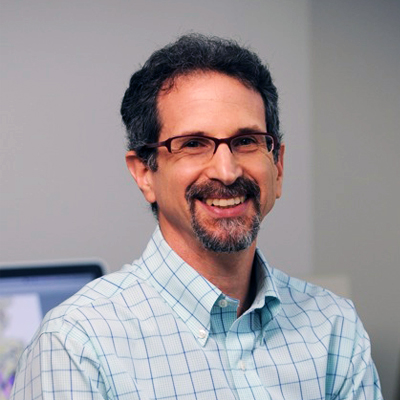Capturing the action of protein machines in health and disease
Disease causing mutations in genes lead to a variety of different diseases. In order to design drugs to fix such malfunctions, researchers must understand how biological systems work at the fundamental atomic level. Dr. Walter Chazin, of Vanderbilt University, works to make sense of the 3D structure and movements of proteins, when alone and when they are in action with other proteins, with DNA, and with drugs and drug-like molecules. His research relies upon a multi-disciplinary, collaborative, and structurally-oriented approach to address key problems in biology and medicine. In addition to enabling the rapid design and testing of lead compounds for the development of drugs, this powerful approach can be applied in the biotechnology arena for the development of new products for consumers ranging from non-toxic detergents to bio-computers.
Dr. Chazin has been integrating the full range of structural biology tools for more than fifteen years. Using his novel approach, his research is able to attack critical biomedical research questions that are very large in scope. Within the Center for Structural Biology that he designed and leads, intergroup collaboration is central to their proven success at producing research that matters. Aside from guiding research in his group and the Center, Dr. Chazin is especially interested in the lives of individuals. Leading the lab with a family-oriented approach, he describes his role with his students saying, “once you work with me, you are always part of my [science] family.” The mix of postdoctoral fellows, professional scientists, graduate, and undergraduate students contributes to Dr. Chazin’s family-style group mentality where everyone contributes and all are responsible for looking out for each other.
Current research includes:
-
Genome Propagation and Maintenance: Dr. Chazin and his team study the properties and movements of several key proteins with an emphasis on understanding how they work together to generate a successful outcome, and what happens when a mutation in the gene produces a defective protein. These studies are laying the foundations to determine how mutations lead to cancer and other diseases.
-
Protein Ubiquitination: The ubiquitination process is important for labeling proteins for destruction and to signal for changes. Defects in ubiquitination are associated with cancer and neurological disorders. Dr. Chazin’s laboratory is making fundamental contributions to understanding how the coordinated action of ubiquitination proteins work together to produce the modified target.
-
Cardiac Arrhythmias: Dr. Chazin has worked within the EF-hand calcium binding proteins for nearly 30 years, most recently focusing on discovering why mutations in certain cardiac ion channels and in calmodulin can lead to fatal cardiac arrhythmias. He and his team are determining if new therapeutic strategies for these diseases can be developed based on their insights.
-
Immune Response: In collaboration with Vanderbilt colleague Eric Skaar and other research groups around the world, Dr. Chazin has shown that the protein calprotectin exhibits a remarkable ability to suppress infections by S. aureus and other devastating pathogenic organisms. He and his team believe calprotectin and calprotectin-mimics represent a fundamentally new type of antibiotic. Their work is also providing critical insights for understanding how hyperactivation of calprotectin and its receptor RAGE lead to chronic inflammation and atherosclerosis in diabetics. These studies are revealing new avenues for treating these disorders.
Bio
When Dr. Chazin was twelve, his family traveled to Montreal for a short vacation. While on vacation, they visited family friends and the father of the host family was a professor at McGill University. Dr. Chazin was impressed by the seriousness of his nature. But what really blew him away was that after dinner, he excused himself because he had to work on a pressing project. Dr. Chazin knew then that he wanted to be a scholar too and work with the same kind of dedication to something he felt strongly about. After completing his undergraduate degree in chemistry, Dr. Chazin took a year off, traveled in Europe and Asia for eight months, and then worked outside of science for one and a half years. Afterwards, he decided to go back to graduate school and focus upon completing his degree (in four years) in Physical Organic Chemistry. From there, he went to the ETH in Zurich where he began the transition to become a structural biologist, starting by applying his knowledge of NMR spectroscopy to the then-new field of protein structure analysis. During this time he realized his niche, devoting the rest of his career to bridging the power of structural methods to advance understanding of biology and medicine.
In his free time, aside from his research, Dr. Chazin lives for his twice weekly pick-up basketball games with the ever changing cohort of graduate students and postdoctoral fellows. He has served as graduate student basketball coordinator for many years and been named ‘commissioner for life’. He also enjoys NY Times crossword puzzles, hiking and walking with his French-Canadian wife Christiane, especially in the Sierras in California. Due to the upsetting loss of one of his closest colleagues to ALS, Dr. Chazin and his team participated in the ice bucket challenge last year (http://youtu.be/QsGxkryLJmo).
Websites: http://structbio.vanderbilt.edu/chazin/
http://structbio.vanderbilt.edu/symposia/chazin/index.php
Publications
Awards
American Cancer Society Junior Faculty Research Award, 1990-93
American Cancer Society Faculty Research Award, 1994-98
http://structbio.vanderbilt.edu/symposia/chazin/index.php

